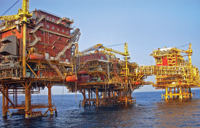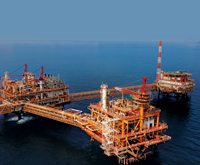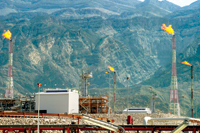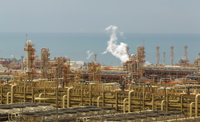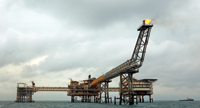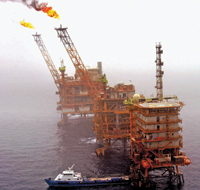
BACKED by a new law, Iran’s oil ministry is hoping to enter into deals with foreign contractors to explore the country’s underdeveloped oil and gas fields.
It remains difficult for sanctions-hit Iran to attract foreign investors with technical expertise to enter into deals and explore its untapped oil and gas reserves.
A new upstream contract structure could potentially attract “non-western” investors from Asia and Russia in particular.
Given that Iran lost $40 billion in oil export revenues in 2012, according to the IEA, after the west tightened its sanctions on the country, any new projects would be a welcome opportunity for the regime in Tehran to show its ability to expand its hydrocarbons sector in spite of external pressure.
Iran is reportedly preparing a new upstream contract structure for foreign companies to explore untapped oil and gas fields in Iran, according to oil ministry spokesman Alireza Nikzad Rahbar.
“Given a new law approved in the month of Ordibehesht (starting on April 20) about the oil ministry’s duties and authorities, the oil ministry has been given authority to close deals [with new terms],” in quotes carried by the semi-official news agency Fars.
Rahbar added that Iran is “preparing contractual and legal grounds to facilitate contractors the procedure of closing deals with foreign contractors and their participation in oil and gas projects.”
It is telling that Rahbar specifically mentions Russian investors: “If agreements are made, we will award the development of non-shared projects to the Russians and other foreign contractors and we will try to develop the shared fields on our own to accelerate their development because domestic coordination is quicker, better and more complete.”
The announcement follows a recent meeting between the Russia-Iran inter-governmental commission in Moscow, during which Russian energy minister Alexander Novak pointed out that discussions including potential changes to Iranian regulations might allow foreign companies to become equity partners in upstream oil and gas projects.
This is significant given that Iran’s constitution prohibits foreign entities from holding equity in upstream projects. The country’s upstream contract structure is based on a less appealing, yet common, service contract scheme under which external investors are compensated from the proceeds of oil and gas sales at a fixed rate of return over a specific period of time.
However, Novak’s remarks indicating a potential shift towards a more investor-friendly contract for Iran’s upstream sector with terms closer to a production-sharing contract could not be confirmed by Rahbar at this stage.
Despite crippling US and EU sanctions against Iran due to its controversial nuclear programme, Russia is keen to get closer to Iran in order to enter potentially lucrative deals in Iran’s oil and gas sector.
Yet, previous efforts have ended in failure. Russian company Lukoil’s joint venture with Norway’s Statoil stopped developing Iran’s Anaran Block, located on the border with Iraq, precisely because of international sanctions against Iran.
Moreover, bureaucratic hurdles and erratic official behaviour on Iran’s part led to the cancellation of a deal between Iran and Russia’s Gazprom Neft, the oil subsidiary of Gazprom, in June 2010. Gazprom Neft planned to develop the Changuleh and Azar fields, both also located in the Anaran Block.
From Iran’s perspective, however, it was Gazprom Neft’s failure to meet its obligations that prompted the cancellation.
Whatever the reasons for Russia’s failed investments in Iran so far, a potential new upstream contract structure could smooth relations between Russian investors and Iran. Tehran is keen to offset the overall consequences of international sanctions; it particularly seeks to attract foreign investors with technical expertise to push its ailing energy sector forwards.
One could argue, given the international pressure, that Iran is showing more flexibility in its legal terms in the upstream sector. In addition to Russian investors, Iran seeks to attract Asian companies who are more willing to go against the US and EU bans on investments in Iran’s oil, gas, and petrochemicals projects.
It is telling that Iran is seeking to change its contractual terms in order to attract foreign investors – most likely from Russia and potentially from China – to reinvigorate the country’s oil industry but particularly invest in largely underexplored oil and gas blocks.
Given Iran’s resource riches, it will remain one of the most sought-after oil and gas prospects in the world.
However, international sanctions have thus far successfully discouraged key international investors and western majors from advancing their hitherto limited projects in Iran.
In fact, in a “back-of-the-envelope calculation”, the International Energy Agency estimates that western oil sanctions cost Iran $40 billion in lost revenues in 2012 as crude exports fell to an average 1.5 million barrels per day over the year – a decline of around 1 mbpd from 2011 levels (based on an average price of $111.70/barrel of Brent oil).



















































































